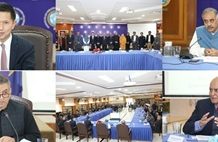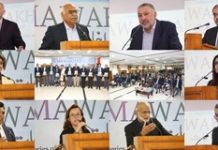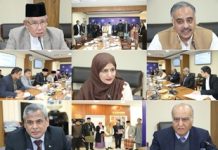As of March 2014, Pakistan has achieved tremendous progress in meeting international obligations to fulfil nuclear safety and security standards. Pakistan has once again secured international appreciation and confidence over its nuclear assets, which are considered a top national responsibility.
Earlier this month, Yukiya Amano, Director General of the International Atomic Energy Agency (IAEA) visited Pakistan and expressed confidence on the steps the country has taken so far to safeguard its nuclear assets. Later, during the third Nuclear Security Summit (NSS) 2014 the US praised the safety and security of Pakistan’s nuclear assets as an example for the world to follow. Pakistan’s active participation in the NSS since the Summit’s inception in 2010, has gradually enhanced its status as a “responsible nuclear state.” There is a strong possibility that this growing international engagement will usher in new avenues of international cooperation in the field of peaceful nuclear energy.
After participating in the first NSS held in Washington, DC in 2010, Pakistan embarked on a number of measures to fulfil its international obligations that included strengthening the command and control system; improving the integrated intelligence system; improving nuclear regulatory and export control regimes; and enhancing the safety and security of nuclear assets against theft, diversion and accidental or unauthorised use. Some of these measures include the establishment of a Centre of Excellence with the potential to grow into a regional and international hub with the support of the IAEA; the establishment of a National Institute of Safety and Security (NISAS) under the PNRA; revised safety parameters of nuclear power plants following the Fukushima accident; and a renewal of the five year Nuclear Security Action Plan. Pakistan has also installed a Nuclear Security Cooperation Programme at fifteen nuclear medical centres and upgraded measures are underway at eight more. To enhance radiological safety, the country has established a Nuclear and Radiological Emergency Support Centre (NURESC) and a National Radiation Emergency Coordination Centre (NRECC) as well. A revised National Export Control List in 2011 also covered the scope of NSG, Australia group and MTCR. The newly established National Detection Architecture deploys special nuclear material sensors at important entry and exit locations to prevent illicit trafficking of nuclear related materials.
In addition to this, Pakistan is a member of the Nuclear Safety Convention, the Convention on Physical Protection of Nuclear Material, the Convention on Early Notification of a Nuclear Accident, and the Convention on Assistance in Case of a Nuclear Accident or Radiological Emergency. Pakistan is also an active member of and a contributor to the Global Initiative to Combat Nuclear Terrorism (GICNT). The country has been fully cooperating with the 1540 Committee and has so far submitted four comprehensive reports. Pakistan held the position of Chairman IAEA Board of Governors for 2010-11 and became a member of the UN Scientific Committee on the Effects of Atomic Radiation (UNSCEAR) in December 2011. Since 2010,Pakistan has been in a position to provide nuclear fuel cycle services under the IAEA safeguards with a non-discriminatory nuclear fuel cycle assurance mechanism.
The above efforts, especially for a developing country like Pakistan, illustrate tremendous achievements in fulfilling international obligations as a responsible nuclear state. However, future aspirations to develop a self sustaining nuclear power programme of 8,800 MWe by 2030 and 40,000 MWe by 2050 may prove to be an unattainable goal without active international cooperation. In this regard, Prime Minister Nawaz Sharif’s request at the recent NSS 2014 to include Pakistan in the list of international export control regimes in the Nuclear Supplier’s Group (NSG) seems unlikely to be accepted by the international community. Though Pakistan is striving to allay any concerns associated with the vulnerability of its nuclear assets from falling into the hands of terrorist organisations and non-state actors, maintaining and upgrading its nuclear safety and security capability will require a strong economy. Any hope the country has to become energy sufficient is dashed by an energy crisis that threatens to further cripple an already weak economy. Therefore, the international community should consider and compensate Pakistan’s efforts in the nuclear safety and security domain by engaging it in non-discriminatory international export control regimes. Such incentives will enable Pakistan to become an active and responsible nuclear state.
Pakistan’s participation in the NSS process clearly reflects that the country is fully committed to pursue the objectives of the international non-proliferation regime. The practical steps taken by Pakistan to ensure the safety and security of its nuclear assets reinforces international measures against nuclear terrorism. In this regard, the international community should not neglect the genuine energy needs of Pakistan and should instead engage the country in such a way that non-discriminatory cooperation not only helps Pakistan to maintain higher standards of nuclear safety and security but it also helps it to meet its nuclear energy needs.
Views expressed are of the author and do not necessarily reflect the views of ISS or of the Government of Pakistan.












